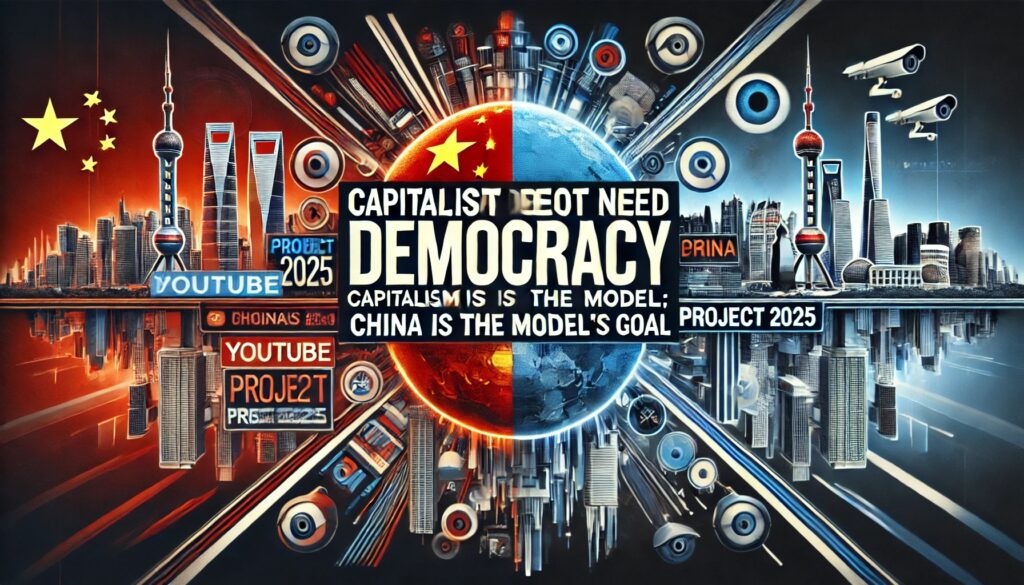We were indoctrinated to believe that capitalism is dependent on Democracy. China proves that the most efficient capitalism occurs in autocracies, and Project 2025 has that as its goal.
Capitalism does not need Democracy.
Podcasts (Video — Audio)
There exists a fundamental misunderstanding about the relationship between capitalism and democracy. From childhood, most Americans are taught to view these two concepts as inherently intertwined—capitalism being the engine of economic freedom, and democracy the system that preserves political freedom. However, the reality is far more complex. Capitalism does not inherently require democracy to function or thrive. China serves as a stark example of a country where capitalism and autocracy coexist and even flourish in tandem. This model presents a troubling future, one that projects like Project 2025 aim to replicate in the United States.
The central point being raised is that capitalism is not synonymous with freedom. The ideology ingrained in the American psyche conflates the two, but China’s economic success under a communist government starkly challenges that assumption. China’s economy, the 2nd largest capitalist system in the world, is characterized by intense state control and a lack of individual rights. Ironically, many American corporations rely on China’s labor force and manufacturing efficiency while decrying the lack of freedom there. The U.S. doesn’t admit that China’s autocratic system allows it to be a more efficient capitalist machine, free from the checks and balances, debates, and regulations that often slow progress in democratic nations.
China’s efficiency in capitalism arises not from a democratic consensus but from an autocratic command. Decisions can be made swiftly, and policies implemented without delay. The autocrat’s word is final, and industries adapt without the roadblocks of public opinion or competing political interests. This is precisely why China has become a global manufacturing powerhouse, producing goods cheaply and efficiently for Western markets. In contrast, in the U.S., changes to economic policies must pass through legislative bodies, subject to debate, delay, and compromise. While this process respects individual freedoms and the rule of law, it also slows the machine of capitalism, making it less “efficient” than China’s autocratic model.
This brings us to the current American political landscape and the threat posed by the ideological goals of Project 2025. Project 2025 is a blueprint for dismantling the remnants of democracy in the U.S., echoing elements of China’s model of authoritarian capitalism. The project, developed by right-wing think tanks and conservative political groups, aims to reshape American governance, concentrating power in the executive branch and weakening the influence of democratic institutions. Their vision isn’t one of outright dictatorship, but it seeks to erode the checks and balances that prevent autocratic rule. Under the guise of efficiency and restoring “American greatness,” the proponents of Project 2025 are preparing the groundwork for a more authoritarian capitalist system—further prioritizing the needs of capital over those of the people.
At its core, Project 2025 is about consolidating power and wealth in the hands of a few, much as the Communist Party of China does. Under the neoliberal agenda, deregulation, privatization, and the rollback of public services are touted as paths to efficiency. However, insightfully, what is labeled as “efficiency” in capitalism is often a euphemism for profit maximization for the elite at the expense of the majority. The American healthcare system serves as a prime example. In imaginary non-math theory, competition between private insurers should lower costs and improve services. It results in fragmented care, rising premiums, and a bloated administrative system. As highlighted, Americans are sold the illusion of choice while navigating an inefficient, expensive system where the real winners are the corporate executives.
The same principle applies to labor relations. America prides itself on being a land of contracts, where individual agreements are respected. However, this respect is selective. Indigenous peoples, for instance, have had countless treaties broken when it suited the needs of the U.S. government or corporate interests. Similarly, contracts between workers and employers are skewed in favor of the latter in the labor market. Patents and intellectual property laws, which claim to incentivize innovation, often serve as tools to extract value from workers and creators, consolidating wealth in the hands of corporations for decades at a time. I cover much of this in two books I wrote, “As I See It: Class Warfare: The Only Resort To Right Wing Doom,” and “How To Make America Utopia: Take The Economy From Those Who Rigged It.”
The push toward autocratic capitalism, whether through the lens of China or Project 2025, reveals an uncomfortable truth: capitalism thrives just as well, if not better, under authoritarian regimes. The idea that democracy is a necessary partner for capitalism is a myth perpetuated to keep citizens complacent. As demonstrated by China’s success and the goals of Project 2025, capitalism is perfectly comfortable operating within systems that curtail personal freedoms so long as profits continue to flow.
Progressives must recognize this dangerous trajectory. As the right wing pushes its agenda forward, cloaked in promises of efficiency and greatness, it is crucial to resist the narrative that capitalism inherently aligns with democracy or that individual freedom is its end goal. The American system is at a crossroads, and the lessons from China are clear: capitalism does not need democracy to thrive, and in fact, it may prefer a system where the voices of dissent are silenced, and the state operates in service to capital, not people.
If America is to avoid the fate of becoming a capitalist autocracy, where profits are prioritized over people and the democratic process is sidelined in favor of efficiency, then it must actively resist projects like Project 2025. The time to wake up is now.

